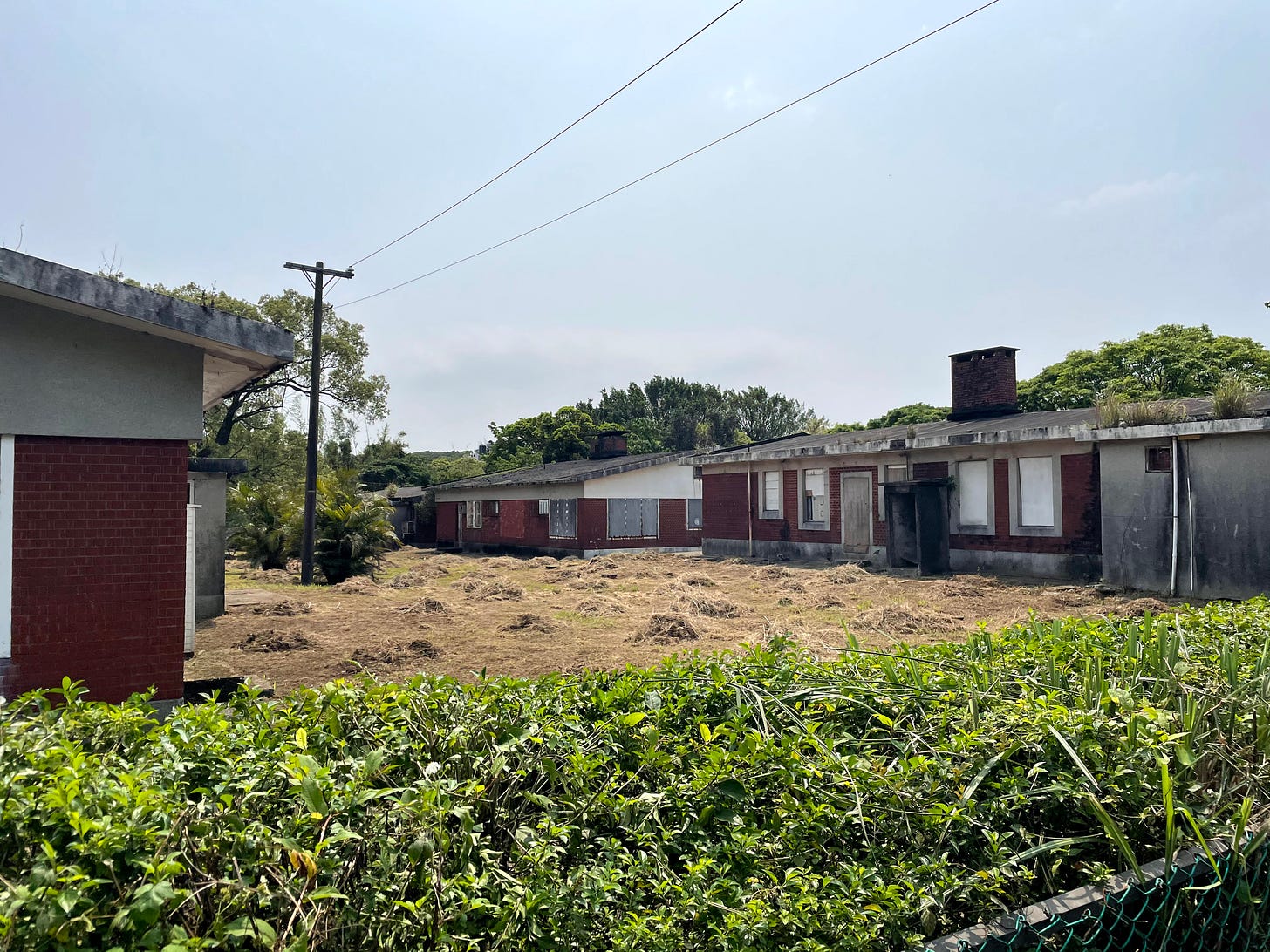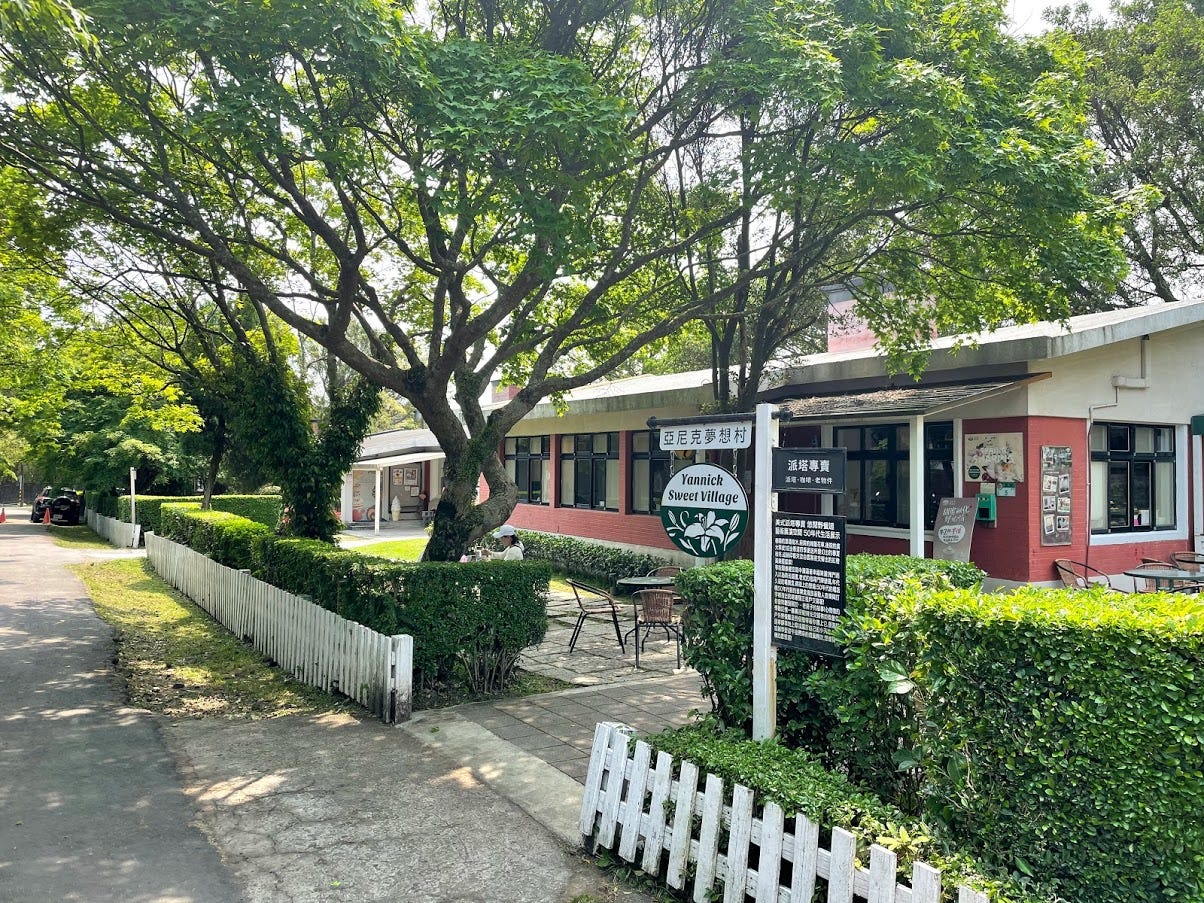Post-FIRE Bliss?, US Base In Taiwan, 7 Words, Remote Work | #135
April 3rd, 2021: Greetings from Taiwan. Here’s a picture of a waterfall we hiked to this past weekend. Still amazed by how many cool outdoor spots there are close to Taipei.
Shoutout to Sunil and David who became paid supporters of the newsletter. Appreciate it! If you’d like to join them, you can do so here,
#1 Tales From Post-Work Financial Independence
The pseudonymous blogger “livingafi” published a fascinating 5-year reflection on his post-work life. If you are not familiar with the “FIRE” movement, it stands for financial independent, retire early. There are many different flavors of this but generally the term describes people who save enough money to stop working by living off lower cost-of-living lives and investment income.
It’s a fascinating world but I find that world a bit too analytical and focused on achieving financial independence via math rather than thinking about what kind of life makes sense.
His essay is a great glimpse into some of the challenges that come with sustaining this kind of post-work life and I thought I’d highlight some of the things that resonated.
He described his first year in positive terms:
I decompressed from work, stopped worrying about how productive I was, and more-or-less became accustomed to living out my days while not worrying too much about status. Or getting ahead. Or anything at all, really.
Despite the mental challenges, I was overwhelmingly happy for the duration.
And his second year which he said he spent a lot of time learning new things, reading, spending time with elder family members and playing guitar, he also found positive.
During this year I was overwhelmingly very, very happy. I think it was the best year of my entire life. I’d decompressed from work during the previous year and so this year I sort of let it all hang out. My wife and I were excited about the changes we’d made and felt closer than ever. Fantastic.
But in the third year cracks started to reveal themselves, especially with his friendships. He found that many people were uncomfortable with the way he was living and notes that “Some of the threads that bound us together for 20 plus years were perhaps unravelling.”
I’ve sense that similar things are happening in my life and it scares me. I have quite a few friends who are crushing it and are headed towards very high-paying paths. I know some of them I’ll stay close to no matter what but I do worry that it might put a separation between us. He felt uncomfortable about this:
Not going to lie. These developments bothered me. The first couple of years it didn’t seem to matter, the differences in our lives. Here in the third year, they do. I speculate that initially they viewed my change of lifestyle as temporary, but after a while, it stuck — they realized that I would not be working again and I am therefore, ahem, officially and forever different. (This is no temporary thing.) I feel sure that some of them also felt that they were, you know, continuing to move and shake and improve their lives whereas, from their perspective, I’d sort of given up — my life appeared to be a static thing, unchanging, and therefore pretty fucking boring.
This is also why quitting your job and following a path like mine is not easy. It’s not about “just doing it.” It’s about being willing to step onto a new plane of reality and risk losing a part of who you are.
It seems that he was comfortable with this shift but that his partner (now ex-partner) grew uncomfortable with it over time:
She felt like she was ‘falling behind’ and this sense made her anxious and uncomfortable — it contributed to feelings of worthlessness, and she felt like she was doing something wrong with her life. Another phrase, similar to the first one but turned on its head: ‘We should be further along in our lives.’
Here’s his hypothesis on what might have been happening:
Something else that I’ve come to believe is this: She felt that her friends were jumping upward in class. It wasn’t just about the material stuff — and it also wasn’t about the fancy vacations per se. It was the fact that upper-middle and lower-upper class people talk a lot about these things — the homes, the upgrades, the travel. It’s their language. Then they weave the material stuff into a narrative about how they’ve earned it, how their life is a struggle and they’ve done incredibly well to pull off this level of comfort, and it all somehow has to do with how incredible they are as people. There’s a self-satisfaction in the conversational rituals that she was missing out on. Perhaps by extension, she was lower class by not being able to participate directly in these spending patterns and conversational games.
I think there is some truth to this. Girard claimed we desire what other people desire and it does seem that some people feel this more intensely than others. I was oblivious to trends growing up and it wasn’t until college that I realized my fashion choices were not aligned with the people around me. I figured out how to look better but my goals seemed to be avoid looking like a fool than having any underlying excitement about anything I was buying.
There’s an interesting bias called the false consensus bias where people think that “their own behavioral choices and judgments as relatively common and appropriate to existing circumstances.” In New York City, at age 30, it was the first time I realized “oh crap, I might not actually want what all the people around me want,” and that others around me might be thinking about things differently.
This disconnect sparked curiosity and I continue to go around asking people how they decided to live their life. It seems many people do have a well-thought out process for thinking about their path, default or not.
The rest of the post is worth reading. Spoiler alert: he ends up taking a job because his financial math changed because of the divorce but is pretty okay with it.
I think the lesson from this post is that almost any path you are on takes work and constant reflection. It does seems that the default path enables one to ignore some of the harder questions for a bit longer than others but eventually you have to have some reasoning behind why you are approaching life as you are.
#2 Old US Military Village in Taiwan
We went on a hike this past weekend in the mountains outside of Taipei and I was surprised to find a former US Military Village in the mountains. Built in the 1950s it looks much more like an older version of American suburbia than anything in Taiwan. It was surprising to see that people created yards despite them being rare throughout Taiwan. It seems Americans want to be able to mow the lawn wherever they go 😂
Many of these are now turned into restaurants and stores:
#3 Reflections On Words
I had a number of things floating around my head this week and decided to just write about a number of words.
(Aggressive) Humor
“That’s just how we show our love.” Growing up in the northeast United States I used to believe that insulting people or making fun of them was a genuine form of caring. It was not until the last several years that I realized some of my best relationships didn’t require any of this. “I’m just joking!” As I grow older this seems empty. One of the best things I’ve enjoyed over the past year is being part of a WhatsApp group chat with four other guy friends who are constantly looking to support each other. It seems like this is what life’s really about.
Cynicism
You know why all our efforts are doomed and you can prove it. You might be right. The bonuses at your company are rigged and you won’t get promoted. Plastic straws are worse for the environment. Maybe, but cynicism is simply a road to more cynicism. Over time your brain can only identify flaws and you become a bit grumpy. The world is screwed up in a million ways but the real challenge seems to be having the courage to look past this and still move forward.
Righteousness
When you read a lot and combine that with a young ego you start to think you are smarter than everyone. You point out flaws in people’s plans, gaps in someone’s political position, and roll your eye’s when people express unpopular views. You see the world as right and wrong and look at everything through this lens. There are only good people and bad people and you narrow your attention to identify other people’s bad ideas. Yet you end up pushing people away and missing the fact that developing this skill, too, is probably a bad idea.
Optimism
I tend towards a “delusional optimistic” view of the world which seems to take power away from the doom-posters, grouchy cable news addicts, and journalists and politicians that use pessimism as fuel. I am fascinated by optimism because I find that this can remain hidden in my conversations with pessimism. I wonder if they are blind to some of the benefits of this mindset? It seems so many interesting things happen when you send out optimistic bat signals but I’ve given up trying to prove this to people. People seem to be more or less who they are.
Friendship
Friendship is weird. We start out spending time with people at the exact same life stage that share our interests in how we spend our free time. As we age we start to realize many of these people were mere drinking buddies and that we are locked out of the shared vulnerability required of deeper friendship. It seems life stages like having kids may offer a window that brings people back together but the real truth is that many will fade out of your life. Luckily I’m an optimist so I still try to keep in touch with friends and making new ones. I think a lot about the kind of people I want to be spending time with at 40, 50, 60 and live my life in a way that might inspire these people to tag along.
Humility
It’s weird that it feels easier to defend your bad ideas for decades rather than pause, nod, and say “hmm that’s something I hadn’t considered.” Living in Taiwan for an extended period of time has changed how I’ve thought about family, freedom, community, government, healthcare, and so many more things. I am living in a different reality in Taiwan and once I faced the fact that I’ve made life work in many different ways and on different continents it starts to make you more humble. I don’t think there is a right way to live but I do think most people are doing their best.
Love
A word so powerful that it seems many are scared to use it, including me. I’ve tried to talk about this word more because I think it is the key to living a meaningful life. I am distraught at how many people in my country are addicted to political parties and movements that deny love to large amounts of people as a foundational principle. It seems too many people take this hidden force for granted and think that it just is something that is there but I think its probably closer to something Erich Fromm said:
“Love isn't something natural. Rather it requires discipline, concentration, patience, faith, and the overcoming of narcissism. It isn't a feeling, it is a practice.”
#4 Remote Choice - Where To Live?
I asked a friend, Leandro, to do a short blurb on something he’s building, which is a resource for remote workers, helping them figure out where to live. Figuring out all the details of moving to a new place is more challenging than you’d expect, from visas to lodging to local nuances of how to engage with the economy.
I think what he’s building will be valuable. Here’s what he’s doing:
Hi everyone, I’m Leandro! I’ve lived and worked in many places around the world and always came across others wanting to do the same. Since research and travel are two of my passions, even if I wasn’t moving to a particular place, I would research things about it for fun. Everything from visas to weather, customs or how to settle in there. After hearing people ask me the same questions again and again I started to take notes. These notes eventually turned into a resource. This resource is called Remote Choice, which I recently launched.
Especially now, where many more people in the world are working from home, I want it to help people discover where to live and work from remotely. I hope it can serve as a useful resource to you too. Having just moved to Mexico, the ins and outs of moving to a new place are second nature to me by now. If you ever have any questions, feel free to reach out.
Thanks For Reading. If you want to support this newsletter read on.
The best way you can support me is to join in the conversation. Share thoughts on Twitter, reply to the e-mail and tell me what resonated or what you’d add or just hit the like button at the bottom!
If you’d like to support further you can become a micro-supporter via Substack or use my affiliate link for the creator platforms I find useful like Podia, Teachable, Wealthfront, or ConvertKit.
Or if you are one of those bitcoin billionaires, you can offer a donation here.








